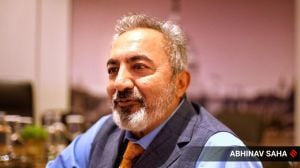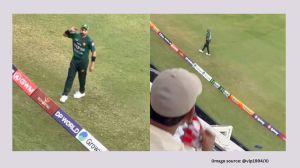Euro rolls in Portugal, Goans have a ball
As the clock crawls towards midnight, the tension mounts under the slow-spinning fans of Ernesto’s Bar at the Club Vasco da Gama in the...

As the clock crawls towards midnight, the tension mounts under the slow-spinning fans of Ernesto’s Bar at the Club Vasco da Gama in the heart of Panjim. The counter is inundated with orders for rum and popcorn chicken, as half-a-dozen middle-aged men assemble for the 10-past-midnight kickoff of Portugal’s showdown with Russia in the Euro 2004 championship. ESPN’s pre-match analysis burbles quietly on a giant screen at the other end, but it’s ignored. They have their own predictions. ‘‘If Portugal loses, we’re out of the Euros,’’ opines Sergio Dias, around a mouthful of unde. ‘‘We need the three points from a win tonight.’’
‘‘No, no, no,’’ interrupts his friend. ‘‘A draw could see us through.’’
The we is instinctive. Sergio, a ‘‘40-plus’’ restaurateur, has 32 cousins in Portugal, speaks fluent Portuguese and has visited the country three times. He makes a face. ‘‘It’s going to be tough.’’
Established in 1909, Club Vasco in the heart of Panjim was once reserved for the landowners and government officers of the Portuguese elite until Liberation in 1961. Now it remains a refuge for members of a generation of Portuguese-speaking Goans for whom the Portuguese never really left. Of course not. They are Portuguese.
‘‘Here come the bandidos!” cries Sergio’s friend Roy Vaz gleefully, as another half-a-dozen middle-aged Portugal fans file into the bar of Club Vasco. Banter and salutations in Portuguese come thick and fast.
Meanwhile, the bar’s not-very-conservative proprietor Ernesto Alvares (27) has his own worries about the impending game. He’s not a football fan, but nevertheless has hung the national flags of all the teams competing in the Euro. ‘‘Very nice,’’ remarked a bandido. ‘‘But where’s Portugal?’’ Ernesto had committed a critical error. He had hung Portugal’s green-and-red flag but forgot to have its national coat-of-arms ‘The Escudo’ painted in its centre. ‘‘That’s a bad omen for Portugal, and for Goa!’’ he was told. If Russia wins tonight, he’ll be in trouble.
The tension shatters in the seventh minute of the match with a goal from Portugal’s Maniche. It’s all plain sailing to a 2-0 win. ‘‘Forca Portugal!’’
Ernesto looks on with some bemusement. ‘‘Those of the older generation support Portugal because they still think they’re Portuguese,’’ he says. ‘‘But from the stories I’ve heard, the Portuguese just stuck a bible in our hands and then robbed us behind our backs.’’
But the Portuguese also placed a football at Goans’ feet. And for many of the football-mad bandidos, nostalgia for the Portuguese is inextricably linked to nostalgia for the ‘‘golden age’’ of Goan football that departed soon after them.
Just ask Joaquim Filipe Soares. ‘‘Why do you want to talk to me?’’ booms Joaquim. ‘‘I’m just a broken cross.’’ It’s a Portuguese expression, meaning an idol that no one worships anymore.
In his case, the expression applies almost literally. After a dazzling start as a central defender—he played for Academicia, a students’ team of amateurs, and Goa in the 1966 Santosh Trophy—Joaquim’s career came to an end when he was 23 with a violent injury to both knees. ‘‘Sports medicine was non-existent then. No more football.’’
When the age of the glorious amateur came to an end, the style of football they played died with them: the ‘‘Latin Style’’ that Goan players learned from the Portuguese when it began to flourish in Goa in the early 20th century. ‘‘The Latin style relied on individual flair and brilliance,” says Francisco Lume-Pereira, a 54-year-old, self-confessed football ‘‘idiot’’, who worked as a AIR football commentator from 1972 to 1994.
‘‘The players were sharpshooters,’’ he grins. ‘‘If they felt they were within striking distance of the goal, they wouldn’t hesitate. It’s all about passing and moving closer to the goal.’’ Adds Joaquim, with a twinkle in his eye, ‘‘But if you look at Portugal, they still play that way.’’
Goan kids today just aren’t interested. A poll of around 40 boys from the Under-17, Under-14 and Under-13 football teams of Don Bosco High School in Panjim reveals the horrifying truth: 14 support England in Euro 2004, 13 support France, five support Spain and Portugal? Three. ‘‘We grew up listening to football commentaries on shortwave Portuguese radio on Sunday nights,’’ explains Alberto Colaco (56), honorary secretary, All India Football Federation (AIFF). ‘‘Today’s generation don’t speak Portuguese and they can watch the English, Spanish and Italian leagues on ESPN. What do you expect?’’
Photos





- 01
- 02
- 03
- 04
- 05


























